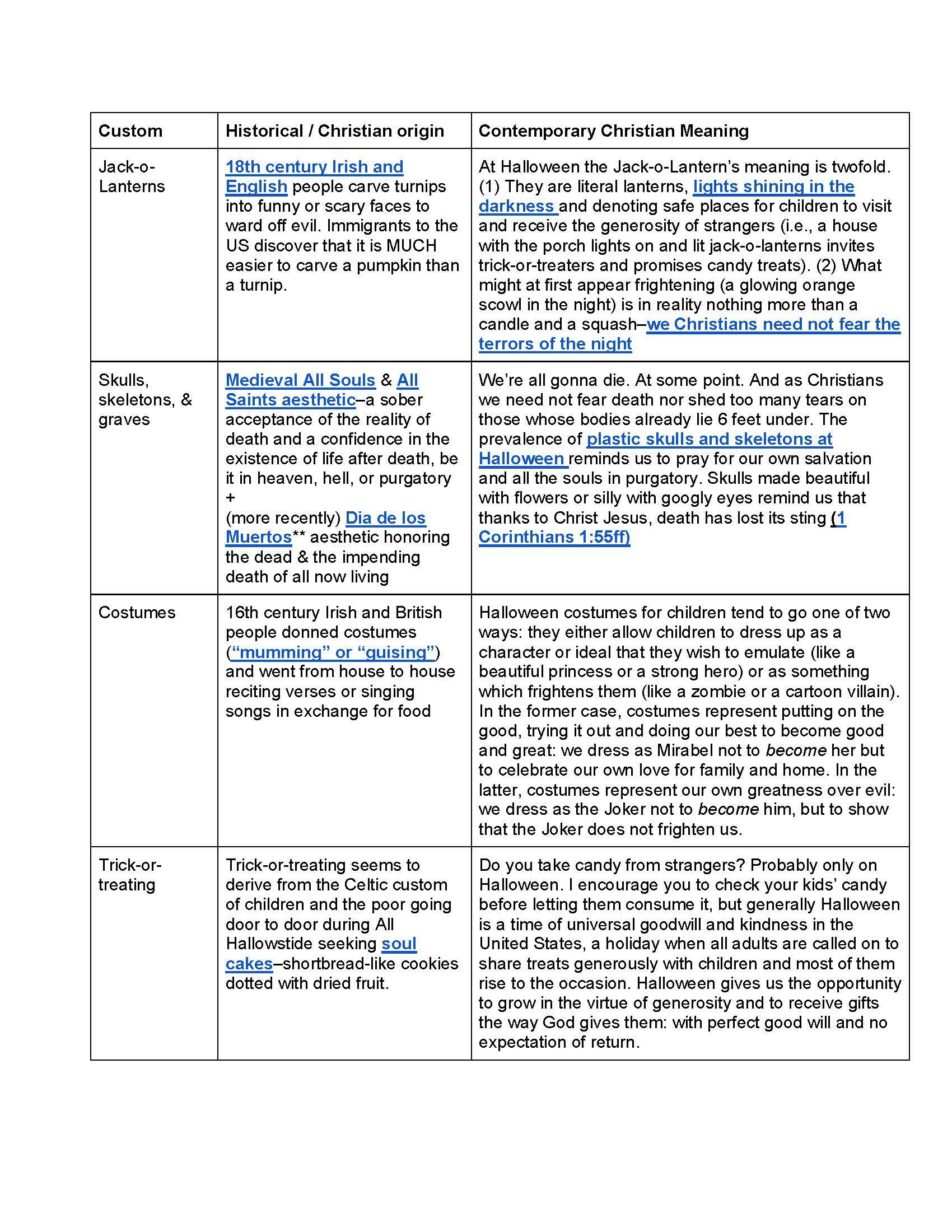Jack-o-lanterns, fabric ghosts, strings of skull-lights, bundles of corn stalks, and cheerful scarecrows decorate the homes along my street in suburban America. The first Halloween Stuff™ hit the stores in my area back in August, but my neighbors and I resisted decorating for the holiday until October 1 at the earliest.
Although people all over the world recognize Halloween, the October 31st holiday has a special place in the hearts and commerce of Americans. We delight in costumes, spooky movies, trick-or-treating, pumpkin patches, and hay rides.
Yet every year–mostly on social media, but occasionally in real-life–I hear complaints that Halloween is somehow “not Christian.”
That’s absurd.
The word Halloween (Hallowe’en → Hallow e’en → Hallow’s Evening → All Hallow’s Eve) refers to the vigil of the All Saints (Hallows, in Middle English) Day Feast on November 1, itself a festal precursor to the All Souls Day Feast on November 2.
Halloween is a Catholic holiday.*
Halloween is a Catholic holiday like Fat Tuesday / Mardi Gras or The Feast of the Seven Fishes are Catholic holidays, that is, it’s a cultural celebration adjuncted to the Catholic liturgical calendar, defined by the greater feast to come but possessed of its own flavor and customs. Just as the day before Ash Wednesday has no real significance on the liturgical calendar (that day is simply the last day of Ordinary Time before Lent begins), the celebration of Mardi Gras –also called Fat Tuesday or Carnival– is a day with extreme cultural relevance.
Our not-too-distant ancestors celebrated Lent as virtual vegans, and so all the meats, dairy, and eggs that would not keep until Easter had to be consumed in feasts of bacon, doughnuts, and buttery cakes. Just as Fat Tuesday’s heavy laden tables are practical feasts preparing the way for Lenten abstinence, Halloween’s scary costumes and lighted pumpkins are festal testaments to the Lord’s triumph over sin and death.
Just as Ash Wednesday’s liturgical heft eclipses Mardi Gras’s revelry, so too All Saint’s Day (a holy day of obligation, by the way!) eclipses Halloween’s candy and costumes. But Halloween celebrations, like Mardi Gras’, are oh so much fun and can serve to enrich our observance of All Saints Day.
Our American Halloween customs mostly grew out of English and Irish customs over the past few hundred years. Here’s a brief look at some popular Halloween customs and their historical Christian origins & meanings:

If you want to inject some additional holiness into your Halloween celebrations, here are some ideas:
-Add a “pray for the dead” sign to your Halloween decor, or slip an “ora pro nobis” note into your trick-or-treat bags
-Say a blessing over your Halloween candy before the trick-or-treaters arrive (I LOVE this cute one by Caryn Rivadeniera!)
-Create a Halloween / All Souls Paper Prayer Chain: each day in October, add a link to an orange and black paper prayer chain. On orange days, pray for someone living; on black days, pray for someone deceased.
-Make “Ora Pro Nobis” boxes for your children on November 1
-Include a cemetery prayer walk in your Halloween celebrations
-Pray for each household you visit while trick-or-treating
-Encourage your parish to host a Saints & Sweets program to underscore the relationship between All Hallows Eve and All Hallows Day
-Encourage your parish to host cemetery prayers to underscore the relationship between Halloween and the Day(s) of the Dead
-Carve and display jack-o-lanterns with explicitly Christian symbolism
-Make soul-cakes, share them with your friends and family, and say a prayer for all souls
*A subset of the anti-Halloween chatter seeks to replace Halloween with Reformation Day–a celebration of Martin Luther’s nailing the 95 Theses to All Saints Church in Wittenberg. Indeed, I suspect some of the anti-Halloween rhetoric is intentionally anti-Catholic, seeking to separate “Christians” from a “non-Christian,” that is, Catholic, holiday.
**Dia de los Muertos deserves its own blog post–I don’t have the space to get into all that here.
A final nota bene: Of course there are some bad, un-Catholic ways to celebrate Halloween. There are bad and un-Catholic ways to celebrate Christmas and Mardi Gras and Easter and Advent, too. But just because some people do Halloween badly doesn’t mean the rest of us can’t wear costumes, light jack-o-lanterns, and pray for the dead like the good, holy, God-loving saints-in-training we are.